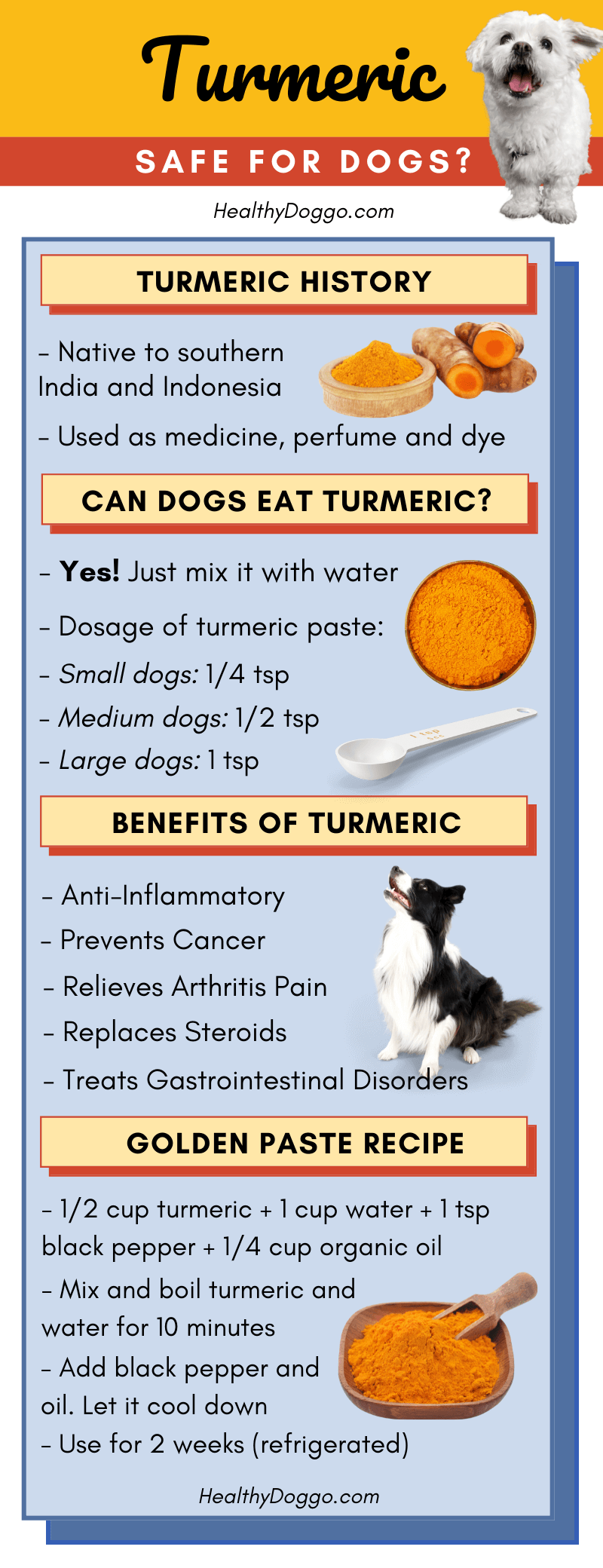If you are wondering if your dog can have some Turmeric, is it safe and good for your puppy, then you are in the right place!
Stiff joints? Have turmeric. Aching muscles? Have turmeric. Inflammation? Have turmeric. Arthritis pain? Have turmeric. Does this make you wonder what turmeric is? And if you already know what it is, does this compel you to feed turmeric to your dogs? If it does and you are confused about making a decision, you have come to the right place.
In this article, we will start with the very basic question: what is turmeric? Then, we proceed on to talk about whether it is suitable to feed turmeric to your dog or not, its ideal dosage, its benefits, as well as its side effects. In the end, we discuss the ways you can feed turmeric to your dogs without the entire process being much of a hassle. So, let us get started right away.
What is turmeric?
In the simplest of terms, turmeric is an Asian spice that originated from the family of ginger and has a distinctive, earthy flavor along with a vibrant, dark yellow color. The most common form of consumption for turmeric is powdered form, which is widely used all over Asia to add flavor and color to curries.
A lot of people have turmeric lying around in their kitchen cupboards but are highly unaware of the wide range of medicinal benefits it offers. And the best part? All these benefits are not only limited to you but also to your dogs. The main component of turmeric, Curcumin, is responsible for all the benefits it offers, including its anti-inflammatory, antioxidant, and anticoagulant properties.
Turmeric dosage for dogs
It is very important to know how much turmeric falls within the bracket of a healthy range, and above what dosage it starts becoming a hazard for your dog. In the majority of the cases, turmeric is fed as a paste, commonly known as ‘the golden paste’, to most dogs, as you can conveniently add this paste to your dog’s food and it would not mind a bit.
For small dogs, you can start with a quarter teaspoon of golden paste per day, gradually increasing its amount. Similarly, half a teaspoon is considered to be enough for medium-sized dogs and one full teaspoon for large, giant dogs. However, do remember to add water to your dog’s food too as only the golden paste might end up causing constipation.

Is turmeric good for dogs?
Turmeric has a lot of medicinal benefits when it is fed to your dogs. Some of those benefits are listed below, to give you a better idea of why you should introduce turmeric in your dog’s diet.
Anti-Inflammatory
In most dogs, hidden, chronic inflammation has been existing for years and years, without the knowledge of the dog’s owner. In the long run, it proves to be the root of all major diseases, which primarily include arthritis and cancer apart from other kidney, dental, and digestive diseases. Turmeric comes in helpful in such cases as it not only acts as an anti-inflammatory drug but also provides the benefits of both aspirin and ibuprofen. Hence, it relieves your dog of the pain they are in.
Prevents Cancer
Turmeric, being a powerful antioxidant, can not only prevent your dog from developing any cancerous tumors, but it can also come in handy to treat existing cancer cells naturally. The curcumin present in turmeric interferes with the development of cancer cells by reducing their growth and spread to a great extent. It not only reduces tumor size but also kills cancer cells.
Relieves Arthritis Pain
Research shows that turmeric performs better than conventional pain medications in cases of arthritis, as it relieves pain and stiffness in the joints caused by arthritis. Curcumin, a component of turmeric, performs as well as ibuprofen for pain relief, as found out by a group of researchers in Thailand.
Treats Gastrointestinal Disorders
Gut inflammation and gut permeability is a common problem in most dogs, though it remains undiagnosed in the majority of the cases. When you add turmeric to your dog’s diet, it automatically targets and treats all gastrointestinal disorders, including Inflammatory Bowel Disease (IBD), among other issues.
Replaces Steroids
Steroids are given to most dogs for allergies and joint pains. Turmeric acts as a perfect substitute for all those steroids by being as effective as them. Moreover, the plus point of using turmeric over steroids is that turmeric comes with literally no side effects, while steroids might cause some in the long run. Also, you can use turmeric alongside steroids to minimize the side effects of steroids on your dog’s health.
Is turmeric bad for dogs?
Generally, turmeric is not considered to be bad or ‘toxic’ for your dog, but it might have some side effects upon over-consumption. The most common of those side effects is an increase in the temperature of your dog’s body. Turmeric is a ‘warming’ spice, so it can lead your dog to search frantically for water. If it does, then perhaps you might need to discontinue feeding turmeric to your dog.
Similarly, if your dog is already upon some medications, it is best to check with your vet before feeding it turmeric. Some medications tend to react with turmeric, so it is always best to get a hearing from your vet before introducing it into your dog’s diet.
How to give turmeric to dogs?
The Golden Paste is a widely known paste made out of turmeric, which can be conveniently added to your dog’s diet to introduce them to turmeric. This makes your dog less suspicious of any addition in their food, and also does the job of ensuring that their health stays in check.
How to make turmeric paste for dogs?
The ingredient required to make the Golden Paste include half a cup of organic turmeric powder, around one and a half cup of water, one and a half teaspoon freshly ground black pepper, and a quarter cup of organic oil.
All you need to do is to cook turmeric and water together for around 10 minutes on low flame until it turns into a thick paste. Then, you can add the black pepper and oil and combine them well into the paste. Allow the mixture to cool and then store it in your fridge in an air-tight container for around two weeks.
Infographic: Turmeric for Dogs




